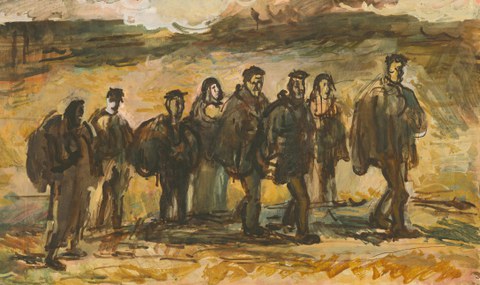Aug 06, 2025
Migration as a New "Method of Warfare": Legal Challenges for Individual Human Rights and the Demise of the Right to Asylum
Public evening event as part of the International Summer School on Human Rights in Theory and Practice: Navigating Chance - Contemporary Perspectives on Human Rights 2025 in Dresden
The first codification of human rights after the Second World War guaranteed all people the right to seek protection from state arbitrariness and political persecution. In 1951, this right was enshrined in the Geneva Refugee Convention - as a direct response to the massive refugee movements resulting from the Holocaust and the persecution of dissidents. It is therefore all the more worrying that this right to asylum is being undermined in a targeted manner today. One example of this is the policy pursued by Belarusian President Lukashenko since 2020: Belarus is trying to overburden the European asylum system through controlled and forced migration to Poland and Lithuania. This strategy is part of a hybrid warfare that Belarus and Russia are using to destabilize the EU and attack its fundamental values - freedom and human dignity - in a targeted manner.
The instrumentalization of migration is not a new phenomenon. As early as 1972, Uganda's dictator Idi Amin threatened Great Britain with mass emigration in order to force military aid. Erich Honecker also lured people from the Middle East to West Berlin in a targeted manner with cheap flights and fast transit in order to exert pressure on West Germany. Today, however, such tactics have taken on a completely new dimension; they are part of large-scale destabilization campaigns, cast doubt on the guaranteed right to political asylum and make it difficult for all refugees - regardless of whether they are part of this political strategy or not - to find protection.
This evening event will therefore shed light on the legal and political challenges of this development. How should hybrid warfare with migration flows be assessed under European and international law? How can politicians react to this and what mechanisms are conceivable? What is the status of refugees who are instrumentalized in a targeted manner for politico-military purposes: do they remain people seeking protection in a legal and political sense, or do they even become a "weapon" that can be fought against?
Guests:
- Katja Maier
Former Minister of Justice of Saxony - Katharina Thote
Representative of the UNHCR in Germany - Dr. Anne Koch
Project "Strategic Refugee and Migration Policy", German Institute for International and Security Affairs (SWP) - Moderation: Prof. Dr. Dominik Steiger
Academic Director of the Center for International Studies, TU Dresden
All interested parties are cordially invited to attend.
- Panel language is German, simultaneous translation into English
- Time: 19:30 - 21:00 (August 26, 2025)
- Venue: Frauenkirche Dresden, main room, entrance D
Neumarkt, 01067 Dresden
Organizing team
The public evening event in the Dresden Frauenkirche is organized by the Center for International Studies (ZIS) together with the Peace Foundation of the Frauenkirche Dresden, the Refugee Law Clinic of the TU Dresden, the University of Leipzig and the TUD Dresden University of Technology.
Sponsored by:
The evening event is financially supported by the Internationalization Funding Programme of TU Dresden and the Society of Friends and Sponsors of TU Dresden.
This program is funded by the Federal Ministry of Education and Research (BMBF) and the Free State of Saxony as part of the Excellence Strategy of the Federal and State governments.
If you have any questions, please contact the official e-mail address of the Summer School organization team:


